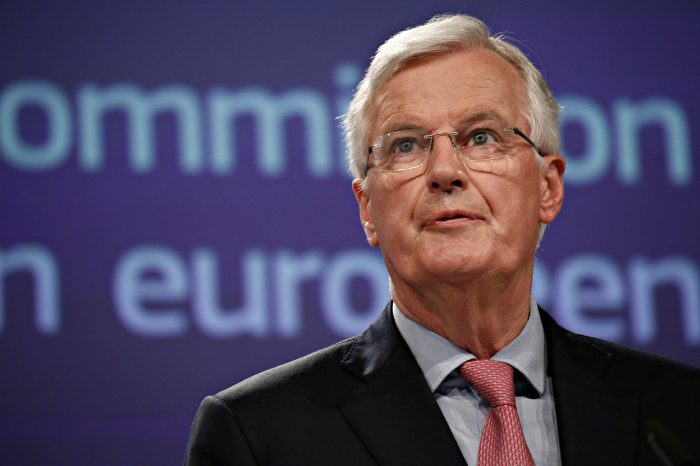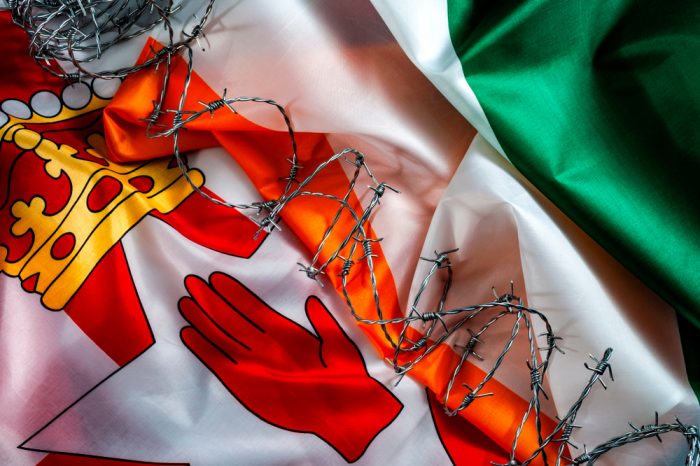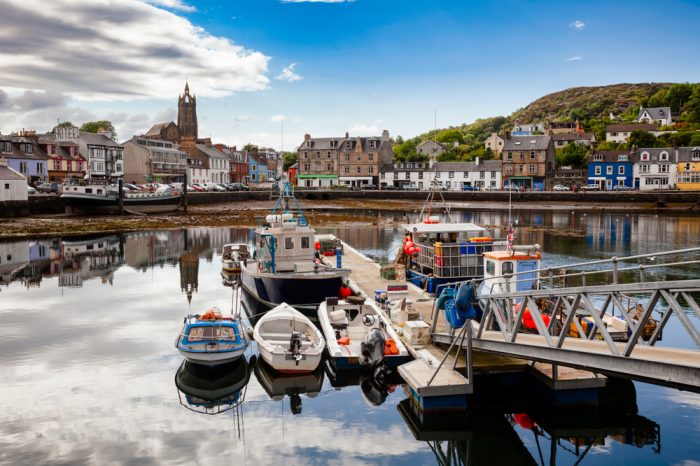Brexit – the current state of play

Edward Spalton gave this review of the Brexit situation at CIB’s annual rally on 14th April 2018. In view of the need for a simple summary of the progress (or lack of it) regarding Brexit, it is may be of benefit for readers to study his assessment of the present state of play.
2017 was an intensely frustrating year for independence campaigners. Looking back at my last annual report, it is remarkable how little has really progressed. Yet we are now less than a year away from Brexit on 29th March 2019 when, as it says in Article 50, clause 3, of the Lisbon Treaty, “The treaties shall cease to apply…unless the European Council in agreement with the member state concerned unanimously decides to extend this period”.
This is one part of the “cliff edge” to which Mrs. May occasionally refers. Much of the law on which we rely for our protection now comes from our 46 year sojourn in the EU. We would be in a legal vacuum at home, if the European Union (Withdrawal) Bill were not enacted by Brexit day to repatriate EU law to the British statute book. For instance, there would be no laws at all protecting food safety.
It is nauseous hypocrisy that Europhiles in Parliament, who never raised the least objection to the outsourcing of huge swathes of our law to the foreign power in Brussels, have tried to hinder the Bill’s passage. They suddenly discovered a devotion to the principle of Parliamentary sovereignty. The Bill, they claim, gives too much power to the government – “Henry VIII powers”- they say. Yet Parliament can sack the government, something it could never do with the European Commission – or with Henry VIII for that matter!
One other great aspect of the “cliff edge” is the interface between ourselves and the EU countries with which we have very close relations on which many people’s livelihoods depend. Mrs. May gave notice that the UK would become an independent country outside the EU and European Economic Area. So all sorts of things just cease to exist, if there is no new agreement with the EU in place by Brexit day. For instance, your driving licence will no longer be valid for EU countries. Neither, of course, will EU driving licenses be valid here – unless it has been specifically agreed, along with thousands of other matters great and small – and there is less than a year to do all this.
After Mrs. May made this intention known in her Lancaster House speech in January 2017, the EU pointed out that all its regulations for dealing with imports from foreign countries outside the EU would apply to British goods after Brexit, if no other agreement was in place. The British government knows exactly what these regulations are because Her Majesty’s Revenue and Customs plus the Port Health Officers and Local Authorities apply these same rules already to goods arriving here from countries outside the EU. The port of Southampton deals with 1,300,000 containers per year. So the government has full information about all the procedures.
There is no excuse for delay in informing export businesses of the rules which they will face – particularly the need for firms to appoint an EU-based representative to take responsibility to the authorities for the compliance of goods with EU health and technical standards, a far more onerous business than an easily computed tariff.
The EU itself has been issuing “Notices to Stakeholders”, setting out the requirements sector by sector . But from Her Majesty’s Government to British exporters, there has been no advice at all.
It seems that the government has been deliberately avoiding consultations with business. Theresa May set up a business advisory council which, at the time of writing, has not met since October 2017. Chris Brannigan, the key Downing Street official responsible for communicating government policy to business, left in June after the general election and has not been replaced. It seems that nobody wants the job. (Edward Malnick, Whitehall Editor, Sunday Telegraph 4 March). In spite of the need to have a confident and well-informed business community, there is a black hole at the centre of government communication. It is as if they are frightened to tell business the likely outcomes of their policy – insofar as any coherent policy yet actually exists. It ought to be known in considerable detail 21 months after the referendum.
Last year I wrote “If we leave the EU without an agreement, British goods will be treated as “third country” origin, That is, from a country outside the EU which is what we want to be! The EU will not be “punishing” us by treating us as an independent country”. The EU has been very clear all along that it would maintain the integrity of its common external border, one of its main institutions. Even countries with “deep and special” free trade agreements, like South Korea and Canada, accept that. There are ways of making compliance less onerous and more “frictionless”, such as electronic pre-declarations for customs and “trusted trader” schemes. The government has conspicuously failed to come up with specific, detailed workable suggestions and has so far neither recruited staff for training nor placed orders for necessary infrastructure. So the EU has developed its own policies which are very unpalatable and in parts completely unacceptable, especially with regard to the Irish border and the so-called “implementation” period after March 29th 2019.
Unfortunately British ministers spent most of 2017 deluding themselves, their more credulous colleagues, supporters and eurosceptic media that we could “have our cake and eat it”. That is, “Britannia would waive the rules” – we could leave the EU, make our own and expect the EU to treat our products as if we were still EU members – a piece of monumental ignorance and arrogance., slightly modified in tone by Mrs May in her speech from Florence in the Autumn and by her more recent Mansion House speech which has not really clarified very much else at all.
In researching these matters, I hunt for various sources of information to get as good an all-round picture as possible. The following short article from Private Eye summarised things so well that I am grateful to the editor for permission to publish it. Whilst it is not comforting reading, it is necessary information for mature campaigners to know.
“DExEU DESPATCHES.
The Department for Exiting the EU, aka DExEU, has never been a happy place. David Davis’s fiefdom took several months to find a formal home in Whitehall. It was able to attract hundreds of bright young things, keen to serve their country in its hour of need in negotiating Brexit. But the sheen soon wore off. Officials privately concede that their ministers are being comprehensively outgunned by Michel Barnier’s European Commission team.
The place also “leaks like a sieve from top to bottom” says one former official.
“Olly Robbins (Theresa May’s Brexit adviser) is basically being left in a room to negotiate without a mandate” says another.
Eighteen months after its creation, 3 per cent of officials are leaving DExEU each month and 44 per cent are likely to leave in the next year, says the Institute for Government.
Even though several thousand officials have been reshuffled across Whitehall to support the creation of DExEU and Liam Fox’s Department for International Trade, the 600 strong DExEU still has 143 vacancies 18 months after it opened its doors. Many of its staff are on short term contracts, either loaned from other departments or from outside the civil service.
If many DExEU staff are on the Whitehall equivalent of “zero hours” contracts, Davis’s team has at least been flashing the cash at management consultants. Deloitte helped set up DExEU in Summer 2016 and others who have benefited from its largesse include Boston Consulting Group, Accenture, KPMG and McKinsey.
McKinsey was paid £1.5 million last September to lead DExEU’s “Brexit Planning”, a move that achieved little other than see McKinsey’s executives pocket inflated salaries while rubbing shoulders with lowly civil servants, safe in the knowledge that they will return to the private sector when all the Article 50 unpleasantness is over.
Needless to say that had nothing to do with Tom Shinner, the department’s director of policy and delivery coordination whose job is to lead “DEXEU’s work to coordinate the domestic policy implications of Brexit across government departments, to seize the opportunities and ensure the smooth process of exit……….”
So it is not very surprising that the EU is able to outrun them by just standing still.
Having failed (if it was ever intended) to have a workable Brexit up and running by March 2019, it is not surprising that Mrs. May is a desperate supplicant to the EU for extra time to get her house in order after all the wasted opportunities of the previous year – not least two months taking her eye off the ball to fight an unnecessary election after Article 50 notice had already been served and the clock was ticking remorselessly down to Brexit day.
Naturally the EU is demanding very severe terms which will place the UK in the position of a vassal state with no rights and Parliament not actually recognised as a real Parliament in the eyes of the EU. Every EU law will apply, including any new ones they choose to spring during this period of “implementation”. Ominously our own government has asked to be able to extend it beyond the originally intended 21 months.
Looking back on our labours since our last AGM, I cannot report much significant progress on three of the key issues which we identified then. Although the EU itself may unwittingly have come to our aid on one of them!
A Truly Independent British Fisheries Policy.
Edward Heath’s surrender of our fisheries to EU plunder as a “common resource” may well be continued. Our territorial waters and Exclusive Economic Zone could easily be used as a bargaining counter. Our friends in Fishing for Leave point out that the proposed “implementation” period would imply the continuance of EU fishing rights and of the iniquitous quota system. Ominously in her Mansion House speech,
Mrs May referred to “shared stocks” of fish – in our own waters! That is rather like catching the burglar red-handed with the family silver and conceding he has a right to share it! The EU has since indicated that it intends to do a little “cherry picking” of its own, demanding the continuance of rights for EU vessels equivalent to the Common Fisheries Policy as part of its price for a free trade deal.
The European Arrest Warrant, Europol and the European Gendarmerie
On the presently suggested terms, these institutions will remain in existence with full powers throughout the “implementation” period. Prominent members of the government are known to favour these arrangements. One Conservative minister was on record as welcoming the possibility of deploying these foreign men at arms on our streets. So far, we have not heard that he has changed his mind! However, the EU has indicated that, as a non member, we may not be allowed to take part in these institutions . So the EU rules may actually protect us from Mrs. May’s fondness for subjection to them, developed during her time as Home Secretary.
The European Defence Agency and European Defence Integration
Following the referendum, the government signed up to a whole swathe of EU initiatives, bringing defence forces closer together. Parliament was not awake to the danger. The government did not sign up to the permanent structure (PESCO) but has gone along with a great deal which has the potential to tie our hands in the procurement of armaments for our own forces.
We continue to campaign on these issues and have prepared an informative booklet for MPs and others. This includes detailed information and suggestions for avoiding the trap of the vassal status of the presently proposed vassal status of the implementation period.
It will be available on the website as a PDF.* A number of copies will be available for sale to members .
Edward Spalton – Chairman
* Brexit Reset In pamphlets section of publications.
31st May 2018 – Supplementary Note.
I can well understand the exasperation felt concerning the lack of progress. Some have suggested that “No deal is better than a bad deal”. If that turns out to be the case on 29 March next year, then the government has followed Mr. Cameron’s precedent of “no Plan B” and Britain and British business are totally unprepared. The Dutch appear to be further forward than us, having begun the training of extra customs staff and allocation of space for new port facilities. Trading with post Brexit Britain, they say, will be procedurally the same as trading with Morocco.
Some companies are already making their own precautionary arrangements. Rolls Royce, for instance, is preparing to move its regulatory compliance operation to mainland EU. EasyJet has moved its headquarters to mainland EU and has plans to change its Articles of Association so that a majority of its shareholders must be EU nationals. This will enable it to keep flying in the “No Deal” situation.
If there is no agreement, Rolls Royce aero engines would have no valid safety certification and cease to be saleable. By leaving the EU and EEA, the government also leaves the European aviation safety agency EASA which produces the safety certification. There is no present provision for non EU countries to belong to EASA. The British Civil Aviation Authority has said that it would take some five to ten years to build its operation up to the required global scale and standard to replace it. There are other similar EU bodies for different industries where the government is trying to get back in on some sort of associate status. Whilst Britain negotiated opt-outs whilst an EU member, it is now trying to negotiate various opt-ins as an independent country. That is somewhat ironic!
When Britain joined the EEC in 1973, our family firm had already received over a year of thorough briefing from the government and so were prepared. We had some problems but could nonetheless get on with making our living from day one. Businesses have to pay their bills and wages every week so a smooth transition is essential. Once businesses close they very rarely reopen. I describe the experience of joining the EEC in the series “The Miller’s Tale” at the end of Episode 2 and all of Episode 3. To give the sort of guidance we then received, the government had to know exactly what it was doing. That does not appear to be the case today.







